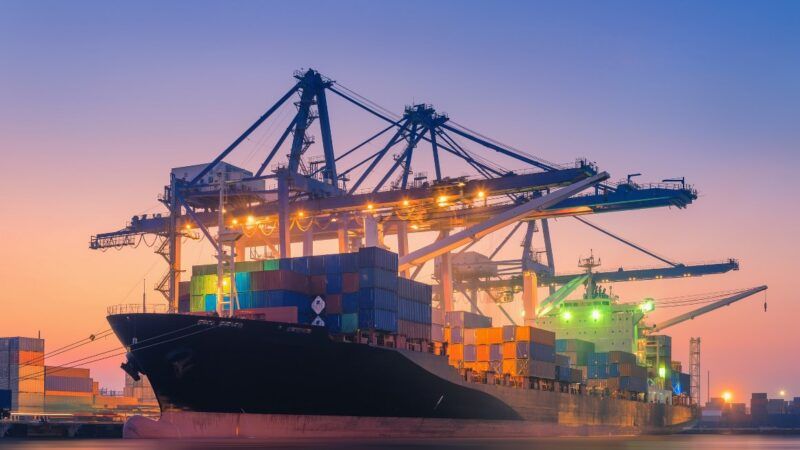Biden Administration Deflects Blame on America's Self-Inflicted Ocean Shipping Problems
Guess whose fault it is that it’s so expensive to ship goods to America? (Spoiler: The U.S. government's.)

Tonight in his State of the Union address, President Joe Biden is planning to discuss the skyrocketing prices of transporting goods to the U.S. across the ocean via shipping and what his administration is going to do about it.
Here's how the White House has framed it in a memo sent out to the press this morning:
The President will explain that most traded goods—everything from the housewares you buy online to the agricultural products that American farmers market overseas—are transported by oceangoing vessels. However, the ocean shipping industry is now dominated by just a small number of giant, foreign-owned companies. Three global alliances—groups of ocean carriers that work together—now control 80% of global container ship capacity and 95% on the critical East-West trade lines. And, since the beginning of the pandemic, these carriers have been increasing shipping costs through higher rates and fees. The President will note that the foreign carriers are now seeing record profits, while prices for American consumers and businesses have risen.
Subsequently, the White House posted a much longer memo announcing that they're getting the Department of Justice involved in antitrust enforcement actions with the intent of "lowering prices, improving quality of service, and strengthening the resilience of supply chains."
While these memos are quick to point out how much money these shipping companies have been making off this crisis and to deem it unfair (during the pandemic, these shipping companies' operating margins have jumped from 3.7 percent to 56 percent), the memos flat out refuse to consider how the federal government's own protectionist laws have created a shipping marketplace that's far from competitive.
Nowhere in these memos do the words Jones Act appear. The Jones Act, more formally known as the Merchant Marine Act of 1920, places extremely strict, deliberately protectionist rules in place that can help explain why shipping prices are high.
The Jones Act requires that goods traveling between U.S. ports be carried by ships constructed in the U.S. and owned and operated by U.S. companies and workers. The ostensible purpose of this old law was to give U.S. maritime companies a domestic advantage over foreign competitors. In reality, the law has backfired magnificently. The domestic shipbuilding industry has collapsed because it's just cheaper to build ships in other countries, giving a handful of companies complete market dominance. This means that most new ships are not compliant with the Jones Act, and attempting to break into the domestic market is oppressively expensive. Only 2 percent of the United States' own domestic freight is transported by sea due to this law.
It also means it's incredibly costly to import goods to isolated parts of the U.S. like Hawaii, Alaska, and territories like Puerto Rico. Ships compliant with the Jones Act cost three times more to build and up to five times more to operate than foreign counterparts. These calculations, Cato Institute Policy Analyst Colin Grabow notes, originate from our own federal government's analyses.
The Jones Act has essentially created the exact same noncompetitive domestic environment that the Biden administration is blaming on foreign companies. In response to the administration's complaints, Grabow observes that just two domestic carriers are responsible for almost all Jones Act–compliant ocean shipping to Hawaii, Alaska, Puerto Rico, and Guam. And consumers there have to pay through the nose for goods.
Essentially, we're all Alaskans these days. The skyrocketing prices we're paying for foreign shipping to the continental U.S. are actually, comically, a twisted reflection of what certain parts of the country have faced for years thanks to the Jones Act.
Grabow tells Reason that the jump in overseas shipping prices during the pandemic is, in fact, a likely result of the various logistical challenges that happened when everything shut down, and it's not simply greed.
"[It] seems to me the far more likely scenario is that a spike in demand combined with port delays (thus reducing the supply of ships) drove prices up," Grabow tells Reason. "Pretty straightforward supply-demand stuff."
It's remarkable that the administration is discussing using antitrust tools to go after foreign shipping companies and finding ways to lower the prices of shipping goods across the ocean when Biden repeatedly declares his support for the Jones Act, which has driven up shipping prices and fueled noncompetitive behavior and gouging here within the U.S.
The White House memo (and presumably whatever Biden plans to say tonight about shipping costs) is an attempt to deflect away criticism over inflation and the massive and expensive inefficiencies in our ports that left cargo ships floating in the Pacific. Solving these issues would involve Biden having to actually address how the union resistance to the modernization and automation of our ports has gotten us to this point. He's not going to do that.
"That the Biden administration accuses foreign shipping companies of excessive rates and market concentration while supporting the Jones Act's severe limits on domestic shipping competition and resulting high rates is the height of hypocrisy," Grabow says. "Any serious effort to promote efficient ocean shipping should start with repeal of this outdated law."


Show Comments (81)